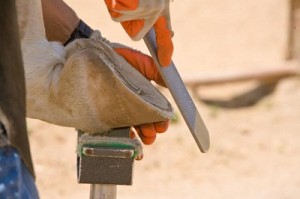 All domestic horses require having complete, regular hoof care. Hooves that are unmaintained will result to unpleasant looking and unbalanced hoofs which in turn affects the hoof’s internal workings, legs’ tendons and ligaments and mainly the horse’s movement.
All domestic horses require having complete, regular hoof care. Hooves that are unmaintained will result to unpleasant looking and unbalanced hoofs which in turn affects the hoof’s internal workings, legs’ tendons and ligaments and mainly the horse’s movement.
So how often should your horse see the farrier for trimming?
It will depend on your horse’s activities as well as the type of riding you do. Generally, most horses should get trimming every eight weeks.
There are horses that require a more frequent farrier visit such as those used for competition. This is because horses used for competition require to have completely balanced feet to ensure they compete at their maximum capability. In addition, having your horse adequately trimmed can reduce risk of injury.
Unshod horses require regular trimming. These horses need to be trimmed about three to six weeks as the soft surfaces that these horses walk on do not cause any wear on their hoofs.
Horses that walk on abrasive surfaces wear their feet down more so they tend to need less frequent trimmings. Although this is the case, these horses still require regular trimming in order to maintain the right hoof shape.
The hoofs of ponies and hacks can be left a longer as these horses are ridden only a few times in a week and will have a wear chance that is close to their hoofs’ growth rate. Mostly, they only need some minor trims just to clean their hoofs’ ragged edges.
Horses having fewer activities and not used for riding should not be exempted from trimming. Horses that fall in this category such as brood mares and retired horses still have hoofs that continue to grow as well as have a wear rate that is very low. This is why these horses also require frequent farrier visits.
What To Look For In A Farrier?
To ensure the well being of both you and your horse, you need to choose a certified, professional and experienced farrier. A farrier is someone who is skilled is various hoof cares such as horse shoeing, blacksmithing as well as knowledgeable about the physiology and anatomy of horses’ legs and feet. An unskilled farrier can expose your horse to risk such as injury, lameness and damage which is why it is best you choose a certified farrier.
Certification and training
Certified farriers have acquired extensive trainings, completed standardized and veterinary related exams as well as proved they possess the needed skills required in the farrier profession. As there are no laws that farriers should first be certified, it is your duty to determine if your farrier is skilled and reliable.
Interviewing farriers
Here are a few essential questions you can ask your potential farriers:
1. Where have you studied, apprenticed or learned your skill?
2. Are you a member of the national farrier organization?
3. In which disciplines are you knowledgeable?
4. How do you handle an uncooperative and difficult horse?
5. Can you provide references?
Things To Know About Your Farrier:
1. Find out of your farrier is punctual.
2. Find out the reputation of the school the farrier got the certification from.
3. Know if the farrier is responsive or good in communication. Determine if the farrier can easily be reached, returns calls, keeps you updated about the work as well as shares essential information about your horse’s condition.
4. Determine if he handles his business transaction and clients professionally.
5. Determine if the farrier can work well with others such as your trainers, groomers, veterinarians and riders.
6. Find out if the farrier understands the athletic level and sport of your horse or knows the right care and shoe wear.
7. Know if the farrier is equipped with all the needed supplies for the tasks

